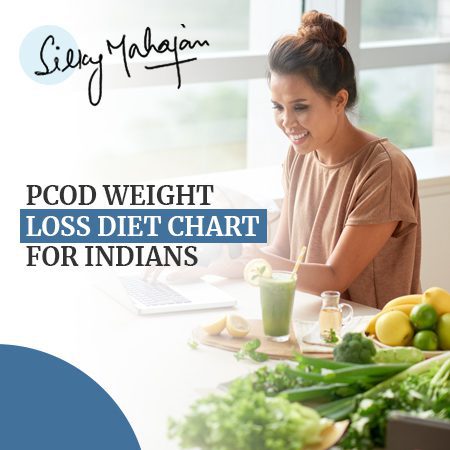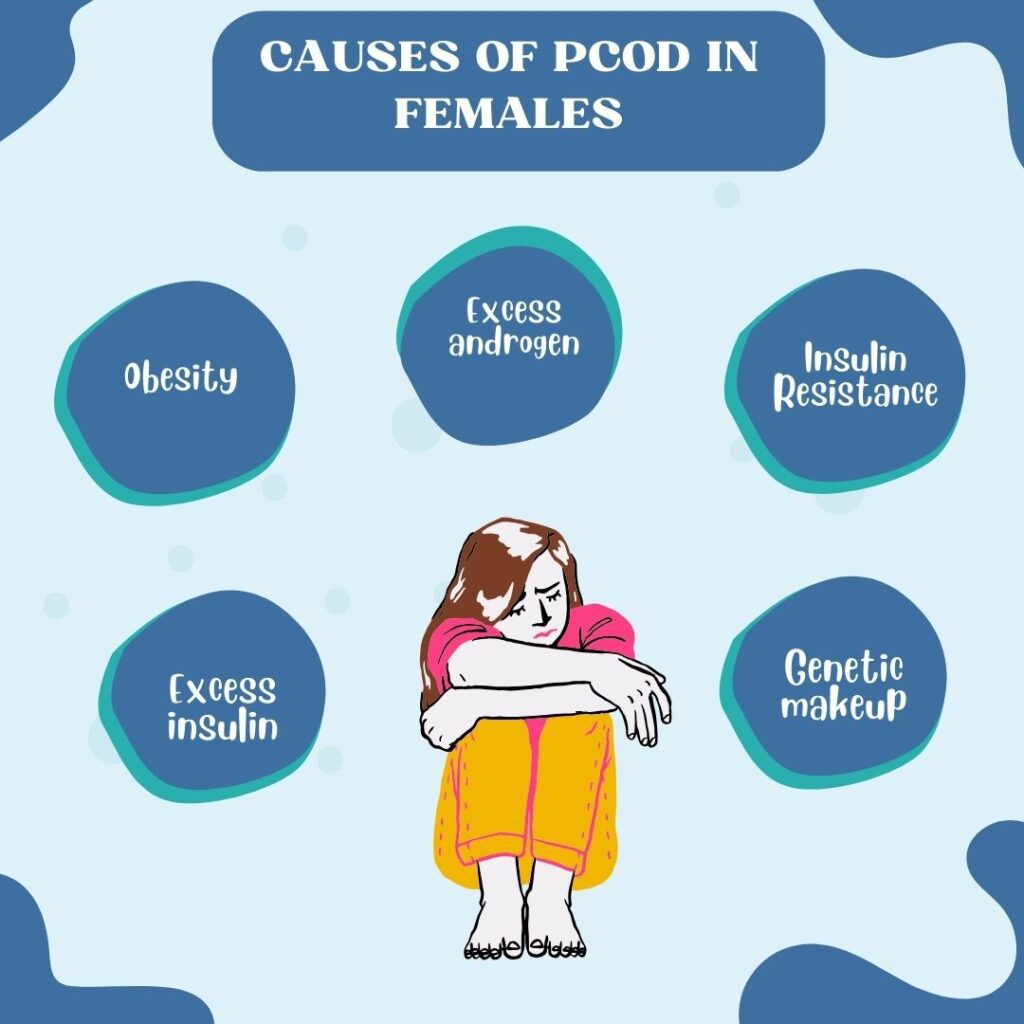
Blog Highlight : Explore our PCOD Diet Chart for Weight Loss designed for Indians. Learn to manage symptoms through diet, balance hormones, and lose weight effectively.
Over 10% of Indian women suffer from PCOD, which makes this condition a prevalent lifestyle disease. PCOD is a type of hormonal imbalance that disrupts the fertility cycle of women and also causes other health complications.
And given the stressful work-life culture of today, PCOD is more common now than ever.
So, what exactly are the causes of PCOD? How can PCOD be detected? And can PCOD be cured through diet and lifestyle changes?
Well, in this blog, we shall discuss PCOD comprehensively and also provide you a sample one-day PCOD Diet Chart for Weight Loss For Indians.
What is PCOD?
PCOD stands for Polycystic Ovarian Disease and is a hormonal imbalance that occurs in women. It occurs in the ovary, which is the female reproductive organ responsible for regulating menstrual cycles, and also produces the female hormones estrogen and progesterone.
PCOD occurs when one ovary starts overproducing immature eggs, which then accumulate in the ovary. This causes cysts in the ovary, which leads to a hormonal imbalance.
Women who have PCOD may have irregular or prolonged menstrual cycles and high levels of androgen, which is a male hormone and can also cause serious health complications like diabetes and heart disease.
Now that you have a fair idea of PCOD let’s look at its causes.
Causes of PCOD
The main cause of PCOD is the overproduction of eggs in the ovary, which causes cysts inside the ovary. The accumulated eggs also cause irregular menstrual cycles that lead to the release of male hormones inside the body.

Although research still hasn’t found the exact reason behind PCOD, a number of other factors are suspected to cause it.
- High levels of inflammation
- Excess androgen
- Insulin Resistance
- Excess insulin
- Genetic makeup
- Obesity
There can be other causes of PCOD, like smoking, living a sedentary lifestyle and even pollution, which leads to irregularities in insulin production.
Here are 5 habits which can worsen your PSOD – Silky Mahajan.
What are the symptoms of pcod in females?
The symptoms of PCOD vary from person to person. Some women start to see symptoms around the time of their first period, while others detect it months after.
Some of the most common symptoms of PCOD are:

1. Irregular periods
This is one of the most common symptoms of PCOD. Women may experience fewer than 9 menstrual cycles in a year, which can occur with gaps of 35 days or even more. This happens due to the high amount of male hormones in the body, due to which ovulation stops.
2. Hirsutism
Due to excess male hormones in the body, females start developing body and facial hair. This condition is known as hirsutism.
3. Body symptoms
Other symptoms may include acne on the face and back or even baldness.
4. Ovary cysts
PCOD can lead to the accumulation of eggs inside the ovary, which then causes them to swell in size. This causes cysts inside the ovary and hamper their normal function.
Managing PCOD through diet and lifestyle modifications
While the exact cause of PCOD is unknown, it’s believed that lifestyle modifications, including following a PCOD Diet Chart, can help manage or even prevent the condition.
Some lifestyle changes to incorporate for managing PCOD are:
1. Maintain healthy levels of body weight
When you maintain a healthy body weight, you reduce the risk of increasing your cholesterol levels, reduce your risk of getting high blood pressure and heart diseases, reduce your chances of diabetes and also maintain healthy androgen levels that play a huge role in regular ovulation and menstrual cycles.
2. Engage in regular physical activity
Engaging in physical activities like running, swimming or even working out will regulate your blood sugar levels, keep your weight under check, and also release endorphins in your body that make you feel good.
3. Diet
Diet plays a significant in managing PCOD. Most health complications occur because of the food we eat. Eating a healthy diet can play a huge role in managing your PCOD.
Now, let’s look at how diet affects PCOD in more detail.
How does diet affect your PCOD?
Studies have found that women who have PCOD have high levels of insulin in their blood. This high insulin level can lead ovaries to create male hormones like androgens and testosterone.
Insulin resistance is caused due to high body mass index, and women who are overweight are more prone to developing PCOD.
This is why a PCOD Diet Chart can play a critical role in managing your PCOD and can also help you prevent it in the first place.
Some diet options to follow for managing PCOD are
1. Foods with low GI
GI stands for Glycemic Index. Foods that have a low GI number means they are digested slowly by the body. This does not cause elevated insulin levels.
A diet with low GI food can include legumes, whole grains, seeds, nuts, fruits, non-starchy vegetables, and other types of unprocessed food items.
2. Anti-inflammatory foods
Eating food items that fight inflammation in the body can help fight PCOD. Some anti-inflammatory foods to inculcate in your diet are leafy green vegetables, berries, fatty fish, and also extra-virgin olive oil.
Now, let’s look at some food items to eat for managing PCOD.
Foods & fruits to eat for PCOD
Diet can be a key factor when it comes to successfully managing PCOD and its symptoms. Have a look at the food items below:

1. Fruits
Fruits contain essential vitamins, minerals, and antioxidants and can be great for our overall health, too. Some fruits that are low in GI are apples, blueberries, cherries, red grapes, blackberries, and even bananas.
2. Vegetables
Try adding green leafy vegetables to your diet, like spinach, broccoli, kale, etc. These are excellent for managing PCOD and also help in improving our skin and hair health.
3. High-fibre foods
Foods rich in fibre, like nuts, avocados, spinach, peas, and oranges, help manage your PCOD symptoms and should be a part of any essential PCOD diet.
4. Fish
Fatty fish contain omega 3s, which are good for our heart and also help regulate bad cholesterol in our body. You can have fish like sardines, tuna, salmon, and mackerel as a part of your PCOD diet.
5. Nuts
Nuts like walnuts, almonds, and pistachios contain good amounts of healthy fats that can help treat PCOD.
Now that you know what food items you can have as a part of your PCOD diet, let’s get to food items you should consider avoiding.
Foods to avoid for PCOD
Since PCOD is related to our lifestyle habits, it’s important to stick to certain dietary rules. It’s a good idea to stay away from packaged and processed foods, which aren’t good for our bodies in general.

1. Refined carbs
Try avoiding any sort of refined carbs like bread, pastries, cereals, pizzas, and any food item that contains white flour.
2. Sugary beverages
If you have PCOD, it is pertinent that you consume any food items high in sugar. Some sugary drinks to avoid are sports drinks, sodas, sweetened waters, and much more.
3. Processed meat
Processed meat can be harmful to your health and can also be detrimental to you if you have PCOD. Avoid all processed meat like salamis, hot dogs, sausages, and more.
1-Day PCOD Diet Chart for Weight Loss For Indians.

| Breakfast | Mid-morning snack |
| 1. Have a cup of oatmeal cooked with water or low-fat milk. 2. A serving of fresh fruits with low GI, like apples, bananas, or berries. 3. A portion of sprouts or 1 boiled egg. | 1. Handful of almonds or walnuts. 2. Cup of green tea without sugar. |
| Lunch | Afternoon snack |
| 1. Have 2 small whole wheat chapatis or a portion of brown rice. 2. A bowl of mixed vegetable curry (avoid using too much oil). 3. It’s recommended to have a small bowl of salad that contains lots of colorful vegetables. | 1. A serving of yogurt or buttermilk. 2. Eat some carrot or cucumber sticks. |
| Dinner | Evening Snack |
| 1. Grilled or baked fish or chicken breast. 2. A portion of cooked quinoa or whole-wheat pasta. 3. Steamed vegetables or stir-fried vegetables with minimal oil. | 1. A fruit like an orange or a pear. |
| Before Bed | |
| 1. Have a glass of warm turmeric low-fat milk. |
This is a sample Indian diet plan for PCOD that you can try following. You will find all the food items at your local supermarket or grocery store.
Parting thoughts
PCOD is a lifestyle disease and can be controlled if you pay attention to your lifestyle and diet. You can also consult a professional nutritionist and dietitian Silky Mahajan to know more about PCOD diets and the type of food you should consume to manage your PCOD symptoms.
A nutritionist can guide you to make better informed food choices for managing your PCOD and enable you to make healthy eating habits that will be good for your general health and well-being.





